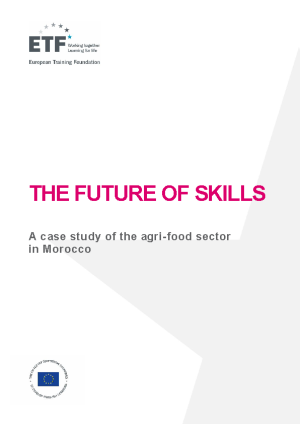The future of skills: A case study of the agri-food sector in Morocco
Download the Summary Note
Key highlights
This study focuses on the agri-food sector in Morocco and ‘drivers’ of change for skills. It alerts education and training institutions to prepare workers for the jobs of the future.
The Moroccan society and economy depend heavily on agriculture production, employing around one third of the population (yet declining over time) and accounting for around 12% of GDP over the past five years. Agri-food as a whole is particularly important in rural areas. It is estimated that around 4 million rural inhabitants are employed in agriculture. On the other hand, the food processing industry has a more limited, but increasing workforce, as around 141 000 people work in the sector at the national level. The agri-food sector accounts for around 21% of total exports.
The Green Morocco Plan 2008‒2020 supported the development of the agriculture sector by fostering closer links between farms and industry, The new Generation Green (2020‒2030) builds upon the achievements of the Green Morocco Plan to further consolidate growth and social improvements in the sector.
Drivers of change in the agri-food sector
The sector has relied upon traditional technologies and skills but automation, digitisation, global trade, competition, climate change, sustainable farming and changing consumer behaviour force radical change.
While technology has the potential to bring radical changes to the sector, there has not been a technological breakthrough in the Moroccan agri-food sector yet. Traditional methods prevail with reluctance to implement new technologies deterred by the high cost. Major innovations relate to irrigation and new plant varieties. Technologies to improve production efficiency are confined mainly to large farms (e.g. precision agriculture). However, innovations in irrigation systems, biochemistry, and pesticides and fertilisers have been relatively commonplace and are likely to bring about future change in the sector. There are also a range of other technologies which indicate important changes, such as data acquisition and analysis, solar thermal devices and chemical separation techniques.
Change is also driven by non-technological, societal and attitudinal factors. Urbanisation leads to changes in consumer behaviour. Consumption of ‘fresh’ products has declined in favour of long-life products. Globalisation is a primary change driver too, promoting competition, innovation, technological solutions and high-quality standards. The impact of climate change will necessitate extensive innovation in water storage and irrigation and new varieties of crops and plant protection techniques, which will require totally new skills to implement and sustain them.
Emerging skills needs
The above-mentioned trends will impact most jobs, creating new ones or transforming existing ones. The capacity of the agri-food sector to obtain maximum benefits from the ongoing changes depends on the availability of skills to facilitate the introduction, use, and maintenance of new technologies and to build on the opportunities offered by new trends.
Both technology and business services-related occupations will be affected by technological change. The new skills needed to master the interface with new technologies will also affect the role of more traditional jobs in agri-food such as agronomists and food specialists. Entirely new professions will emerge as well in the future, typically at the boundary between disciplines. These new jobs include, for example, those related to the new niche markets that will emerge, such as environmental economist or nutritionist engineer. In general, the majority of workers in the sector will need to possess a wider range of skills than in the past, in particular multi-disciplinary competences and the ability to interact with people from different disciplinary or professional backgrounds.
Suggestions for future policies and practices
The government of Morocco is an active change agent through long-term strategies, promotion of cooperatives, support for education and training and initiatives such as agropoles. However, specific policies could be put in place to ensure that workers have the right skills for the upcoming jobs in the agri-food sector. Among others:
- supporting a greater convergence between agriculture (upstream) and food processing (downstream) to develop an integrated vision for the agri-food sector development;
- ensuring transfer of new technologies to farms of all sizes through sectoral associations, cooperatives, and/or public institutions;
- promoting different types of collective organisations, to be provided with greater capacity;
- improving information on emerging skills and training needs to effectively review education and training curricula (more updated, green, practically-oriented, relevant);
- expanding the capacity of vocational education providers to attract and retain students with the creation of new schools dedicated to specific value chains;
- diversifying local products and improving quality, also through improvement of related value chains;
- enhancing continuing training and reskilling and upskilling as a way to grant adaptability of workers to rapidly changing skills needs in their jobs and to give them tools to transit to new jobs opportunities, in close cooperation with the private sector (including work-based learning practices and internships).
Did you like this publication? If you would like to be notified when new content like this is published, subscribe to receive our email alerts.
